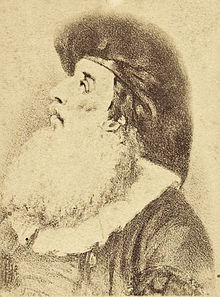Johann Andreas Benjamin Nothnagel
Johann Andreas Benjamin Nothnagel (1729–1804) was a German Jewish painter who painted famous paintings of Jewish rabbis and leaders. A portrait of an artist, thought to be his self portrait, is found in the Nagler Exhibition.[1]
Some of this artist's paintings have become identified with famous rabbis from decades before his time, for which he drew imaginary portraits. Copies and sketches of his pictures and etchings have been attributed to the images of various rabbis, sometimes the same image serving for two different people.[2] They have been printed in Jewish history books, and in the past 100 years or so have become part of the Sukkah ornaments, with the writing of Isaiah's prophecy (30:20) '...and your eyes shall see those who show you the way'.[3]
Some of his art was stolen by Nazi Germany. The Israel Museum exhibits one such picture, retrieved from the Nazi plunder, but which the details of are now obscure.[4]

Another, of Rabbi Naphtali Katz (Cohen Zedek) is shown at the Jewish Museum in Frankfurt, Germany.[5] Cropped and reversed on a vertical axis, this image became identified with the rabbi, who fled the town after he was arrested and falsely accused of burning down the crowded Jewish section of Frankfurt. He had been released after proved innocent in trial, but still held to blame by the Christian public, documented in antisemitic writings, accusations later replicated by the Jewish Haskallah movement, and even modern day Researchers[6]
His picture of a bearded man (probably depicting a German rabbi) is thought to be "a type more than a picture".[7]
References
- ^ Probably self portrait of the artist in his early years. Friedriech Nagler exhibition, (Drawings and Prints website)
- ^ An etching of Rabbi Isaac Luria's image showing Nothnagel's etching or a copy of the drawing, usually attributed to Rabbi Naphtali Katz, in a discussion about the history of rabbi's pictures
- ^ Rabbis sitting in Sukkah under image of rabbis in Tripoli, and image of rabbis for Sukkah with some of Nothnagel's depictions (Daat Academy website)
- ^ Image of Mr. I.S. Ettling Israel Museum, from looted art during the holocaust.
- ^ The original picture in the Self Administration Exhibition at the Jewish Museum of Frankfurt
- ^ Rabbi Katz was accused of using black magic either to test his Kabbalah powers and amulets, or to curse the Christians of the city by burning a cross. His Christian maid testified that in the early morning she had warned the rabbi, who was in his study, of a surprising smell of fire coming from the kitchen while it was a fast day and no cooking was being held. After rushing to the kitchen they found that the fire was rather from a room rented to a Christian tailor for his workshop, who had left a burning candle there. The Jewish section was burnt down, along with the synagogue. Details of the size of the fire differ. See 'Shalshelet Zahav', Rappaport-Heartstein, 1931, Muncacz, Ch.5 p.25 and 28 (29 in the PDF). See also (in German) Heinrich Graetz, Geschicthe der Juden X (439) who quotes the antisemitic claims by Johann Jakob Schudt supposing a grain of truth in them. See A Profile of R. Naphtali Katz by Prof Yehuda Liebes of the Hebrew University who claims that using black magic through practical Kabbalah and testing amulets for fire befit the knowledge we have of Naftali Katz, from other sources, but then also notes (remark 63) that the main source of the more radical claims against Katz are from Schudt.
- ^ A bearded man Nothnagel exhibition
